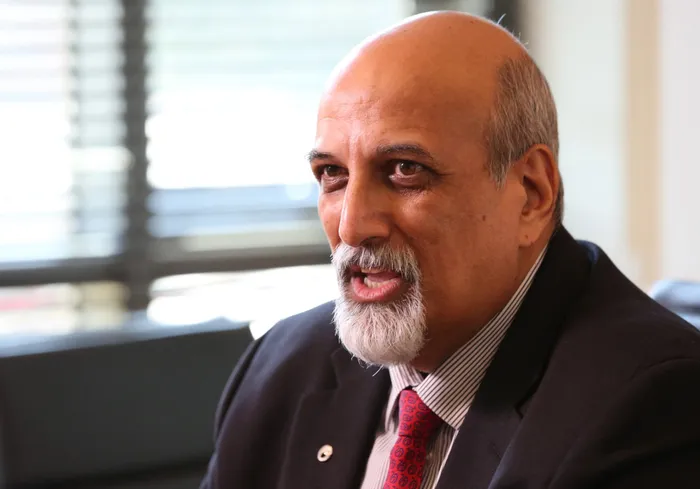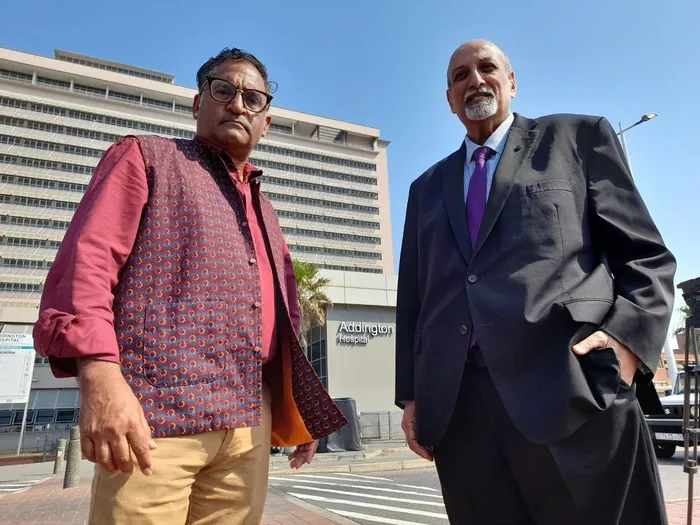
Prof Salim Abdool Karim has condemned vigilante groups demanding to see IDs from people seeking medical care at Durban's Addington Hospital.
Image: Picture:Zanele Zulu/Independent Newspapers
World-renowned scientist Prof Salim Abdool Karim has vocally condemned police inaction at Durban’s Addington Hospital, describing the scene of vigilantes illegally turning away foreign nationals seeking medical care as an instance of “lawlessness.”
According to the Independent on Saturday, the incident unfolded as the police stood by, witnessing the blockade without taking any action.
Three and a half decades ago, Prof Karim protested against racial segregation at the same hospital, where medical services were indiscriminately divided along racial lines.
Arriving back at Addington this week, he was confronted with a new form of segregation, this time along lines of nationality, as self-appointed immigration enforcers were halting people at the gates and denying entry to documented and undocumented foreigners alike, as well as South Africans lacking identification.

Dr Raymond Perrier the director of the Dennis Hurley Centre and public health expert, Professor Salim Abdool Karim, outside Addington Hospital where they confronted vigilantes preventing foreigners from accessing medical care.
Image: Supplied.
“These are individuals who have taken the law into their own hands,” Abdool Karim stated, "and who have been given that ability to do that by the police who deliberately did not arrest them.”
He underscored the failure of law enforcement, likening their inaction to what was witnessed during the violent unrest of 2021, which resulted in over 300 fatalities.
For the last two months, groups operating under the banner of March and March have assumed the role of gatekeepers, arbitrarily deciding who can enter Addington Hospital. Their presence has since extended to other hospitals in Gauteng.
The vigilantes reportedly work in shifts to ensure continuous monitoring, denying entry to anyone without a South African ID.
Prof Karim expressed concern over the legitimacy and motivations of these gatekeepers. “I would not be surprised if these people are being paid to come and do this,” he said.
His questions about the authorities' tolerance of such activities revealed a disheartening truth: “The police are saying, you can do whatever you want to here.” Abdool Karim lamented the implications of this situation, which he sees as a symptom of a creeping lawlessness reminiscent of recent civil unrest.
On his visit, he and Dr Raymond Perrier, director of the Denis Hurley Centre, confronted the gatekeepers, who asserted their authority to conduct citizen's arrests.
“What struck me was that they were highly organised,” Abdool Karim noted, describing the vigilantes as “zealots” who remained unflinching in their role.
Even when he attempted to assist a woman in accessing medical care, she had already complied with their demand for identification prior to his intervention.
He emphasised that emergency medical care is a legal right, particularly for pregnant women and children under six, while treatment for undocumented individuals depends on available resources.
Clarifying misconceptions about healthcare for foreigners, he stated, “There is no country I know where a foreigner can come in and get free health care. They get health care, but it's not free,” advocating instead that decisions about who is treated should reside with the government and not vigilantes.
“What they're doing is illegal,” he asserted. “It should never be allowed at all.” He believes that it is the responsibility of the government to address issues concerning foreigners in a humane manner while adhering to the Constitution and the law.
Despite his upcoming trip to Japan, Abdool Karim and members of civil society have vowed to keep monitoring and challenging these unlawful actions.
He stated, “If anyone got turned away, I would make it my job to work with that person and get them into that hospital.”
He reflected on the unspoken tension during his visit, suggesting that the presence of cameras appeared to deter potential violence from the gatekeepers.
In an ironic twist, both he and Perrier were asked to show their IDs upon entry, a demand they resisted while instead questioning the vigilantes for their credentials, IOS stated.
“The protesters were saying that Karim and I didn't have a right to demand to see their IDs,” Perrier explained, noting their incredulity over the inaction from law enforcement, which has persisted for weeks.
Foster Mohale, spokesman for the National Department of Health, condemned the protest actions undermining healthcare, urging law enforcement agencies to take steps against anyone violating the laws of the country.
Meanwhile, the IOS reported that the Denis Hurley Centre, alongside other civic groups, are preparing a legal submission to the courts to compel police action, citing negligence in upholding their duties.
IOL